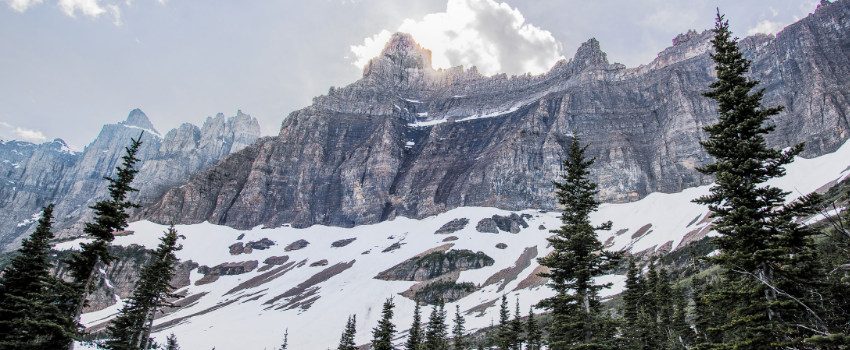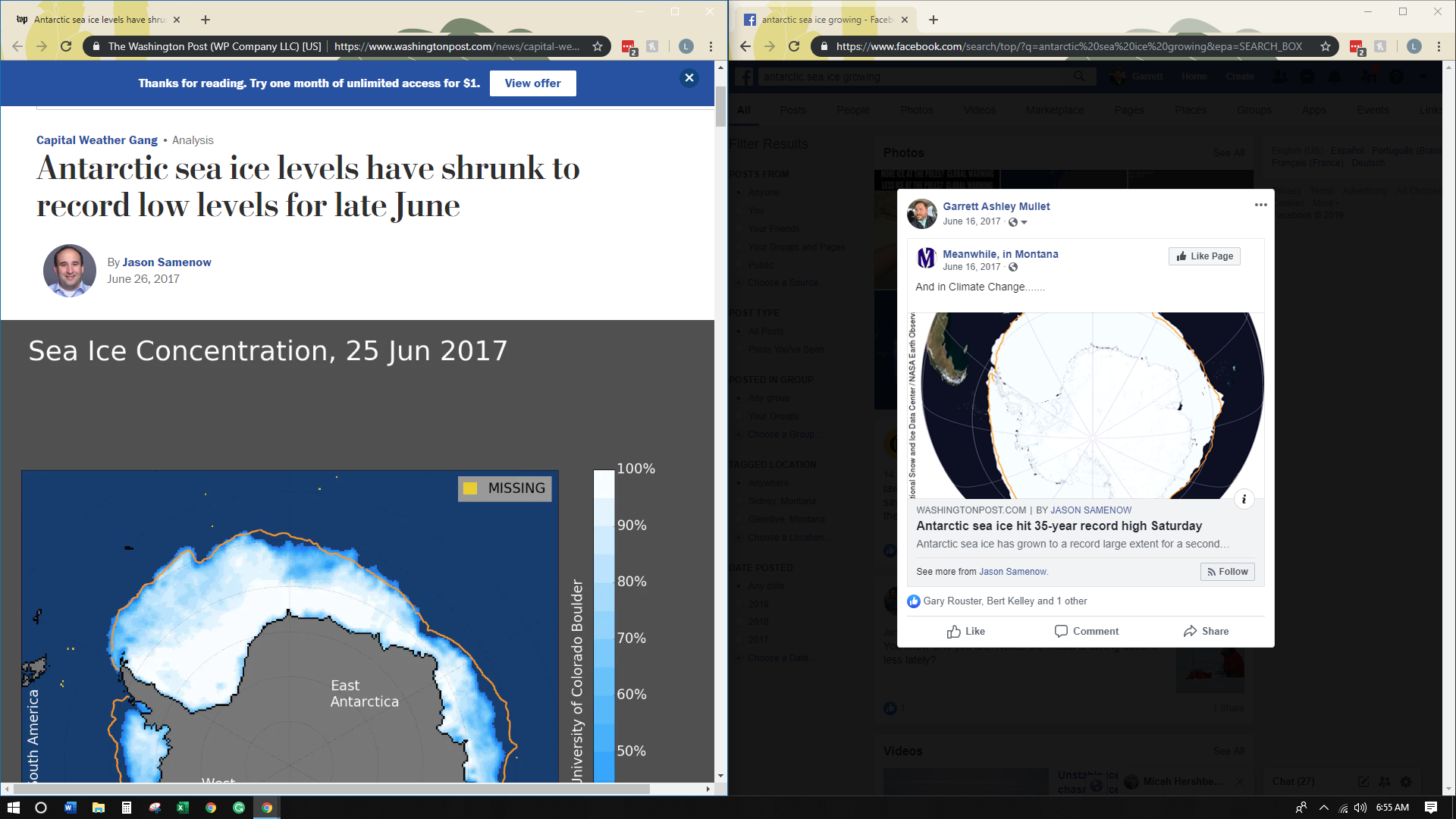
It was a rainy Saturday morning in Eastern Montana. I woke up, made myself a cup of coffee, and similarly woke my computer from its nightly slumber.
I checked my Facebook notifications as I sipped. There I found new replies to a comment I had made on a post by the Billings Gazette, a local Montana newspaper.
An article had been published concerning a lawsuit designed to hold up construction of the Keystone XL pipeline. This pipeline is a massively controversial but necessary piece of oil and gas infrastructure which environmentalists oppose on ideological grounds.
For proof of this, consider a quote from Stephen Volker, the attorney representing the environmentalist groups that filed the suit.
“We shouldn’t forget the underlying issue here — global warming.”
Naturally, the public discussion on the post by Billings Gazette had turned quickly into a Climate Change debate
I recalled an article from The Washington Post I had shared to Facebook a couple years ago, written by a certain Jason Samenow.
Ironically, Samenow’s original article on climate change which was shared by me is not the same now as it was.
This is because on June 25, 2017 Jason Samenow updated his Washington Post article. And the headline at the top of the page changed from “Antarctic sea ice hit 35-year record high Saturday” to “Antarctic sea ice levels have shrunk to record low levels for late June.”
Indeed, in the time since I originally shared it, Samenow’s article has changed far more than the climate has.
Starkly Different Titles and Conclusions

Yet there were still other changes to the link I had shared besides a different title.
Consider the closing remarks to the original version of the article.
“Ultimately, it’s apparent the relationship between ozone depletion, climate warming from greenhouse gases, natural variability, and how Antarctic ice responds is all very complicated.”
Then followed a quote from former staff writer at Climate Central, Michael Lemonick, now opinion editor at Scientific American. I will spare you the tedium of repeating that quote. You can of course follow the link yourself to read it if you like.
Now, however, the end of Samenow’s June 2017 update reads quite different.
“More straight forward indicators of climate change include ocean heat content, sea level rise, Arctic sea ice (currently near record low levels), and of course, surface and atmospheric temperatures. And all of these indicators show the Earth is warming and support multiple lines of evidence that this warming is mostly human-caused.”
Can you spot the difference in tone and confidence?
I shared the 2013 version. Its tone was nuanced. Climate science is complicated.
Yet in the 2017 revision readers are assured there is ample evidence not only that the Earth is warming, but that this warming is mostly due to human activity.
Pay no attention to that man behind the curtain, thunders Oz the great and powerful wizard.
Questionable Revisions, More Questionable Conclusions
Perhaps due to inexperience or inattention, I personally have never encountered a situation like this before.
I know journalists print retractions. For instance, it is common to find revisions to fast-moving, late-breaking stories.
Suppose there’s a mass shooting, terrorist attack, or a high-speed chase. The initial details might be wrong. A name, place, or quote may prove to have been unsubstantiated. In such cases, journalists and news organizations typically put “UPDATED” or something of the sort along with the newer, better information.
What I have never seen or heard of before is a 4-year old story being resurrected and updated with completely opposite conclusions and implications. It would have made ever so much more sense to have published an entirely new article with the new information.
A likely explanation for the significant revision of the original article on June 26th of 2017 is that Facebook pages like “Meanwhile, in Montana” started sharing Samenow’s 2013 article on and around June 16th of 2017.
I know how I watch the traffic at On The Rocks. When certain articles suddenly become popular again after years of relative dormancy, I take note. Institutions like The Washington Post are doubtless only more vigilant and dedicated, since this is their bread and butter livelihood. On The Rocks is only a side gig.
They noticed a spike in traffic on Jason Samenow’s 2013 piece concerning inexplicable record Antarctic ice growth. Groups and persons opposed to climate change hype and legislation were sharing the article to make their cases. Consequently, Samenow and The Washington Post decided to update the original article, so as not to undermine the cause.
Climate Change a Settled Science?
For another highly relevant example, consider news broken this week that signs around Glacier National Park assuring visitors that all the ice would be gone by the year 2020 were themselves quietly disappearing.
Much higher than expected snowfalls in recent years have caused some glaciers at the park to grow by as much as 25%.
This begs a question. Is the primary interest of the authoritative-sounding scientists, journalists, and politicians really to educate the public as to the science, irrespective of ulterior agendas, profit motives, or ego? If so, why is such subtle massaging of perception considered necessary? Why are such retractions not as loud as the initial claims?
Let me argue in defense of the ignorant common man that supposedly makes up the public at large. We “Deniers” can be forgiven skepticism.
For decades, an unceasing parade of doomsday predictions have been issued. These were supposed to persuade us that Climate Change is both real and man-made. Moreover, we were told to drastically alter our culture, political systems, and whole way of life to combat this.
The predictions turned out to be faulty, however. The models had used incomplete data. What we were told to expect did not happen. Are we then the rubes?
Jason Samenow and The Washington Post believe the science is settled. OK! Set that aside for a moment, though.
When a 2013 article is oddly revised in 2017 to give impressions opposite the original, I say we are being manipulated.
Further, when signs around Glacier National Park predicting that all the ice would be gone by 2020 are quietly removed, how could a reasonable person not withhold their support?
Heads I Win, Tails You Lose
We covered this topic in a series of articles on Global Warming three years ago. The attitude of those hyping Climate Change is ‘heads I win, tails you lose.‘
All evidence supports the foregone conclusion most convenient.
When the evidence appears to support the claims and predictions of Global Warming, they trumpet it loudly. So also calls for counterproductive and draconian legislation aimed at curbing human prosperity, productivity, and growth.
Sometimes, however, the evidence contradicts the predictions of Global Warming. In those cases, we are told the data is peripheral and not terribly meaningful.
In other words, just take their word for it. Don’t worry your pretty little heads about the evidence.
At what point do we reject the hysteria of predictions like those Al Gore made in An Inconvenient Truth? Sea levels were going to rise by 20 feet. Yet such predictions came to nothing.
Add to this reports of the prolonged and unexpected solar minimum that is now upon us. Global temperatures will now decrease rather than rise as a result of that. But humans have no influence on what the sun does, so this is moot.
In short, many a common man, with unrivaled access to research and contrasting opinions and conclusions thanks to the democratization of information which the internet has produced, rejects the Climate Change agenda as nothing more than a power grab and money-making scheme.
He is wise to do so.